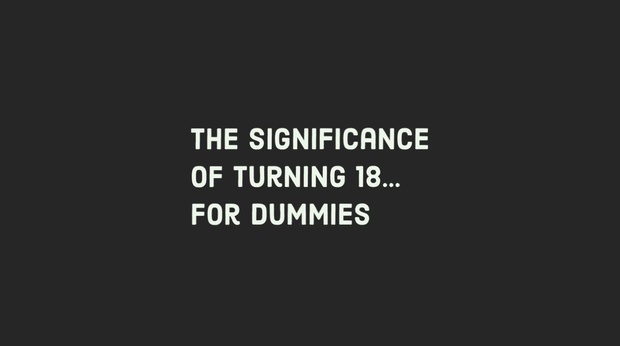
Any voting age is going to be somewhat arbitrary. One answer is to have no voting age at all, allowing five-year-olds into the polling booth to cast a ballot. For people who are not cranks, however, some kind of age requirement should apply.
Of all the possible ages, the age of 18 is the least arbitrary. In the eyes of the law, people. who have reached this age are no longer children. Their parents no longer have responsibility for them and so they are considered adults.
The law does grant people younger than 18 certain rights and privileges. For example, a 16-year-old can apply for a learner driver's licence. They can also grant or withhold permission for medical treatment.
These rights are not the same thing as reaching majority (on that concept please see the note below).
They are instead known as "ages of licence." These are the ages in which people have permission to do certain things.
Most ages of licence kick in earlier than the age of majority. This is not true in all cases, however, and some ages of licence do not apply until several years into adulthood. Gambling in a casino is one example. Adopting a child is another.
Another threshold that people sometimes (wrongly) think about is the age of consent. When somebody has reached the age of consent, you can have sex with them without committing statutory rape or child sexual abuse. The punishment for transgression does not fall on the child but on the person who has engaged in the unlawful content.
Advocates of lowering the voting age, almost universally on the political left, tend to analogise to a convenient age of licence as a reason for extending the vote to children. But the choice of one or the various ages of licence is itself an arbitrary one.
Various things do kick in at 16 but other things kick in a bit earlier. For example, you are allowed to stay at home by yourself and even babysit for other children at the age of 14. You can join the armed forces at 17.
Ages of licence tend to relate to capacity. We can reasonably expect a 14-year-old to be responsible at home. A 17-year-old can be expected to be better equipped to handle basic training for the army than someone who is a few years younger.
But as advocates of making the voting age 16 constantly point out, eligibility to vote should not be seen as a question of competency. Older people whose faculties are diminished can vote. Stupid adults of all ages can too.
So the constant appeals to competency-based ages of license do not make all that much sense. Legal adulthood, on the other hand, is much less arbitrary as a watershed. It ties the right to vote to becoming an adult, rather than arbitrarily granting it to some minors and not others.
Perhaps there is good reason for reducing the voting age. If we are trying to avoid arbitrary distinctions, however, the MakeIt16 crowd actually have a tougher time of it than proponents of the status quo. The distinction between legal adults and minors is a much more natural one than the distinction between 15 and 16 year olds.
Why is lowering the voting age is so unpopular. It’s not that everyone who failed to go the j-school is somehow bigoted and incapable of rational thought. It’s just that people who are not journos are much less likely to spend most of their day getting their brain fried by Twitter to the point that they can no longer make common sense distinctions.
Note: 18 is the de facto age of majority in New Zealand. There is still a law on the books stating that New Zealanders reach majority at 20. But this no longer reflects the substance of the law.
